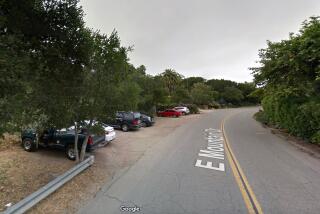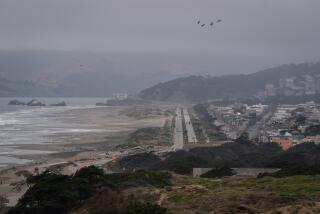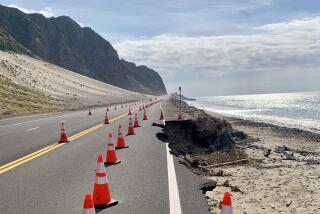Editorial: The tide finally turns on L.A. County beach access
In the ongoing battle between the California Coastal Commission and property owners over public access to the beach, one of the lengthiest skirmishes has been the one the state agency waged with Malibu resident Lisette Ackerberg. But after more than a decade of legal wrangling in and out of court, the commission — and beachgoers — finally have what is rightfully theirs: a 135-foot paved path from Pacific Coast Highway to Carbon Beach, one of Malibu’s most stunning beaches and the backyard of many multimillion-dollar homes.
Along the coastline of California, the public has the right to access the sand between the mean high-tide line and the water. But getting there from the road can be difficult. The commission often negotiates access through private beachfront property when owners apply for permits to build or renovate. In the 1980s, it issued permits to Ackerberg and her husband to build a house, pool, tennis court and seawall. In return, the Ackerbergs promised to allow a public path to the ocean. But instead they put up barriers and built the tennis court where the path was to have been. The commission ordered Ackerberg to clear space for the path in 2009, and an L.A. County Superior Court judge upheld the order. It wasn’t until 2013 that Ackerberg settled with the commission, agreeing to unblock the pathway and paying $1.1 million to resolve Coastal Act claims. Some of the funds went to construction and some will help with maintenance of the path, which officially opens Tuesday. The rest will be used to provide or improve public access elsewhere in Malibu. The new pathway is about half a mile from the Carbon Beach East path, which opened in 2005 after a long legal battle with entertainment mogul David Geffen.
It’s shameful that it has taken so long for beachfront property owners to carry through on their obligations to provide public access to the water. But there are indications that some are now complying more quickly. For most of its four decades in existence, the Coastal Commission could only cajole, threaten or sue residents into providing access. But for the last year it has had the power to levy fines for violations — at $11,250 a day per violation — and many property owners have been complying within a month. In fact, compliance has been so prompt up and down the state that the commission, so far, has not had to actually levy any fines this year, a spokesperson says.
Whether property owners simply want to do the right thing or whether they’re seeking to avoid steep fines, it’s heartening to see the tide turning in the public’s struggle to get to its beach.
Follow the Opinion section on Twitter @latimesopinion and Facebook
More to Read
A cure for the common opinion
Get thought-provoking perspectives with our weekly newsletter.
You may occasionally receive promotional content from the Los Angeles Times.






